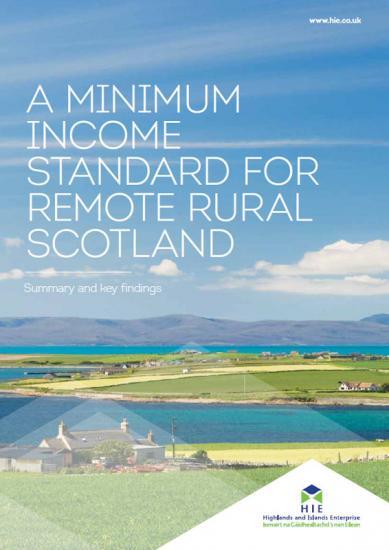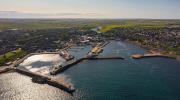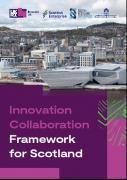Research Reveals Remote Rural Scotland’s Minimum Income Standard
3rd July 2013

New evidence published today [Thursday 4 July 2013] shows the cost for householders in remote rural Scotland to achieve a minimum standard of living.
The research will help inform public policy and highlight where it can make the biggest difference to alleviate higher costs.
A report commissioned by 10 Scottish public and community service organisations reveals that some Scottish remote rural mainland and island households need between 10 and 40 per cent more income to achieve the same standard of living as people living in urban areas of England.
According to ‘A Minimum Income Standard for Remote Rural Scotland’, factors including higher fuel bills, travel to work costs and the prices of food and other essential goods are all critical.
The report also says that tackling any one of these major cost contributors would have a major impact on people’s cost of living.
Alastair Nicolson, Head of Planning and Partnerships at Highlands and Islands Enterprise, which led the group behind the research said: "We commissioned this report to improve understanding of where the key issues lie, how these interact and what measures could help people in different areas on a given income.
“By pinpointing the most important sources of higher costs in remote rural Scotland, it is possible to develop mitigating interventions that will help raise living standards, particularly for those on lower incomes.
“People choose to live in remote rural locations for many different reasons, in particular a higher quality of life. The benefits of this can sometimes counteract the higher costs but we are keen to see what else we can do to make living in these areas more sustainable and attractive. ”
Minimum Income Standard (MIS) is a nationally-recognised programme of research carried out by the Centre for Research in Social Policy (CRSP) at Loughborough University. The team that produced this UK-wide research applied the method to remote rural Scotland in partnership with the University of Highlands and Islands' Centre for Remote and Rural Studies, with further inputs from University Campus Suffolk.
It compares the budget required to cover the cost of a basket of goods and services across a variety of households to meet a minimum acceptable standard of living. MIS looks beyond the items needed to survive to include a range of things people need to have the opportunities and choices to participate fully in society. Judgements about what items are needed are made by groups of members of the public.
The research was carried out with pensioners and working age groups from across the Highlands and Islands and rural southern Scotland, including island communities. It reveals that including rent, minimum household budgets range from £320 per week for a single adult in a remote mainland town to £672 for a couple with a family in an island settlement.
For pensioners living in remote mainland Scotland towns, the cost is just over 10 per cent higher than in rural towns or urban areas elsewhere in the UK. For singles or couples with children living in remote small settlements it is 30-40 per cent higher than in urban England and 10-15 per cent higher than in small English settlements.
On the plus side, the report also confirms that social interventions already being made by public bodies are having a positive impact. Lower rents and council tax bills in comparison with England, subsidised transport and free prescriptions and eye tests are all helping to contain costs.
Donald Hirsch, Director of CRSP said: “People in rural Scotland have the same ideas as everyone else across the UK about what comprises a minimum acceptable standard of living.
“The findings indicate that while no single factor is responsible for the extra cost of living, heating bills, travel to work and the costs of food, clothes and household goods all combine to have an impact. The report identifies that some costs in rural Scotland are lower – but that these go only a small way to compensating for the areas where costs are higher.
According to MIS, every week a single social tenant living in a remote Highlands town pays about £15 less in rent and £6 less in council tax than their English equivalent, but spends £10 more on domestic energy and £35 more on petrol. This creates much greater budget additions than savings, even before additional food, household goods and clothing costs are taken into account.
Di Alexander, Chairman of the Rural and Islands Housing Associations Forum said: “Whether you live in the north or south of rural Scotland, town or island settlement, the cost of living is significantly higher than in urban Britain. Fuel poverty, particularly in the ever-increasing private rented sector, is two to three times higher for most rural households.
“The housing-related lessons are clear - rural and island communities need more, better quality homes which ordinary households can afford to rent and run. The homes provided must be built to the highest energy saving standards and this investment must come without squeezing the rents of already hard-pressed rural households.”
Katie Schmuecker, Policy and Research Manager at Joseph Rowntree Foundation, the organisation that produces a Minimum Income Standard for the UK as a whole, said: “JRF research shows the cost of living in the UK is rising fast at the moment. With wages stagnant and benefits and tax credits being cut, there is a growing gap between incomes and the cost of living, putting real pressure on the money in people’s pockets. This new report shines a light on how this squeeze is even more acute for those living in high cost areas, like remote rural Scotland.”
HIE’s Alastair Nicolson concluded: “We at HIE have been working with communities for almost half a century to help offset the economic challenges for those who want to experience the high quality of life which can also accompany rural community living.
“That it costs more to live in remote rural areas will not surprise most people, but the findings have provided us with a quantified and nationally comparable evidence base from which to develop public policy for remote rural Scotland."
‘A Minimum Income Standard for Remote Rural Scotland’ is available online at www.hie.co.uk/MIS
Related Businesses
Related Articles
Workforce North event spotlights Highland economy
EMPLOYERS and educators from across the Highlands have gathered to hear how a new initiative is aiming to transform the region's economy. Workforce North - A Call to Action brought together business leaders and teachers from primary and secondary schools from across the Highland Council area with a wide range of partners geared towards education, learning and skills development at Strathpeffer Pavillion.
Tartan challenge for UHI students offers £1,500 prize
Students from across the University of the Highlands and Islands (UHI) partnership have been challenged to design a tartan and be in with a chance of winning a £1,500 cash prize. Highlands and Islands Enterprise (HIE) has launched THE COMPETITION to mark 60 years since the regional development agency (then named Highlands and Islands Development Board) was established in November 1965.
The Rural AI Roadshow - How AI can help your rural business thrive
Scotland's enterprise agencies (Scottish Enterprise, Highlands and Islands Enterprise, South of Scotland Enterprise) The Scottish AI Alliance and The Data Lab have joined forces to plan and deliver an inspiring and educational Rural AI Roadshow. There will be three, one day, Rural AI Roadshow conferences taking place across Scotland in January 2026.
Digital and AI innovation round-up for November
Scotland's digital future is accelerating, with AI and tech innovation transforming businesses. In this blog, HIE's Theresa Swayne shares November insights on funding, leadership, and how organisations can harness technology to stay ahead.
Reflections from SEWF Rural: global lessons for the Highlands and Islands social impact economy
As we mark 60 years since the region's economic and community development agency was established, it's timely to reflect on the global aspects of our work on shaping rural futures. The recent Social Enterprise World Forum (SEWF) Rural Gathering in Sabah, Malaysia, welcomed changemakers from Australia, Ireland, India, Canada.
Scottish Entrepreneurial Ecosystem Guide - FREE To Download
Scottish Enterprise's Entrepreneurial Ecosystem Guide provides an overview of more than 150 organisations that support new and growing companies in Scotland. The guide includes incubators, accelerators, specialist industry programmes, co-working spaces and networking organisations.
Funding approved for Wick Harbour port consultant
A specialist ports consultant has been appointed to develop a long-term strategic plan for Wick Harbour Authority (WHA) in Caithness. WHA has secured £47,775 from Highlands and Islands Enterprise (HIE) and the Nuclear Restoration Services, NRS Dounreay towards the cost of the services.
Enterprise and innovation agencies join forces in new framework
Scotland's three enterprise agencies have joined the UK's national innovation agency to agree a collaboration framework that aims to help Scotland become one of the most innovative small nations in the world. The Innovation Collaboration Framework for Scotland brings together Highlands and Islands Enterprise, Scottish Enterprise, South of Scotland Enterprise and Innovate UK with a commitment to support ambitious businesses to invest in research to drive economic growth, create good jobs and help tackle major societal and environmental challenges.
£3.4m HIE investment in Arnish Road, Stornoway
The project, led by the Stornoway Port Authority, will involve upgrading the full length of the 3.3km Arnish Moor Road. Highlands and Islands Enterprise (HIE) has approved a £3.4m contribution to a £7.2m public funding package for a major project to transform road access to strategic industrial and port sites on the Isle of Lewis.
As HIE reaches 60, new chair says best is yet to come
The newly appointed chair of Highlands and Islands Enterprise (HIE) says the region is on the threshold of a new era of economic growth. Angus Campbell's term as chair began officially on 1 November - 60 years to the day since HIE's forerunner, the Highlands and Islands Development Board (HIDB) opened for business with just six employees.
